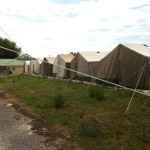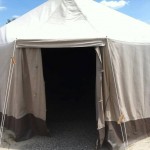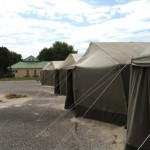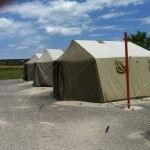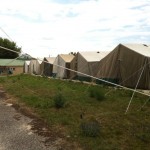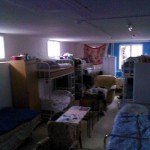In June, a tent camp for asylumseekers was opened in Nagyfa in Hungary, and now there is also a tent camp within the refugee camp in Bicske. No bathrooms or kitchens are provided, and the July heat is suffocating. Notably, Bicske is a pre-iuntegration camp for recognized refugees, supposedly a place to sort out bureaucratic paperwork, study Hungarian, look for employment. Many projects are funded by the European Refugee Fund for recognized refugees. Now the Hungarian Government is also placing asylum seekers in the camp. We wonder what sort of report the Ministry of the Interior will prepare for the EU, explaining how they used the integration funds.
All posts by marc
Information note on the main asylum related legal changes in Hungary as of 1 July, 2013
The Hungarian Helsinki Committee has prepared an information note in order to provide a brief overview about the fundamental asylum-related legal amendments entering into force on 1 July 2013 in Hungary.
The Hungarian Helsinki Committee has prepared an information note in order to provide a brief overview about the fundamental asylum-related legal amendments entering into force on 1 July 2013 in Hungary. The amendments introduce a separate detention regime for asylum-seekers, seriously weakens the judicial review of immigration and asylum detention and the right to appeal in asylum procedures, as well as it fails to ensure adequate reception conditions. The HHC notes with serious concern these changes, some of which may raise incompatibility with international human rights norms and EU law.
The note describes
- the legal situation between January and June 2013,
- asylum detention,
- judicial review in asylum procedures and
- reception conditions.
In concluding the note the HHC raises its concerns that:
- no proper impact assessment was carried out before the amendments and
- key stakeholders were not provided with adequate time to consult and comment on the amendments.
The HHC will closely monitor the implementation of the amended regulation in the forthcoming months.
The paper can be downloaded here.
We are here to be Hungarian people!
New video online:
http://www.youtube.com/watch?v=j50KhK5CqHY&feature=youtu.be
Hungary passes legislation allowing widespread detention of asylum seekers:
Statement of the European Refugee Council (ECRE):
This Monday, ahead of the European Parliament’s vote on Wednesday that formally adopted the recast Reception Conditions Directive, the Hungarian government amended its asylum legislation which will introduce the detention of asylum seekers for up to six months. Both UNHCR and ECRE’s Member, the Hungarian Helsinki Committee (HHC) have warned that the grounds for detaining persons seeking international protectionare too broad, and as a result, there is a significant risk of the widespread detention of asylum seekers. Marta Pardavi, Co-Chair at HHC has critised the aim of the legislation:
“The Hungarian Helsinki Committee has always been against the detention of asylum seekers as a general measure and strongly recommends considering alternatives to detention in each individual case. We are concerned that the sole aim of this new measure is to deter asylum seekers from entering the EU through Hungary in order to seek protection. This way, Hungary essentially shifts its responsibilities to Serbia and other countries.”
According to UNHCR, under the new Hungarian law, detention would be applied as a tool for migration control, penalising unauthorised entry and preventing unlawful onward movements, which would also run counter to the conditions in the European Convention of Human Rights (Right to Liberty and Security, Article 5) which would mean that a suit could be filed before the European Court of Human Rights. Among other grounds, the amendments introduce the possibility to detain asylum seekers to establish their identity or nationality, and when “there are well-founded grounds for presuming that the person seeking recognition is delaying or frustrating the asylum procedure or presents a risk of absconding”.
UNHCR has noted that most asylum seekers are unable to provide identification documents and that this should not automatically result in detention or be interpreted as unwillingness to cooperate. The legislation also allows the detention of families with children, which has been strongly opposed by UNHCR and the Hungarian Helsinki Committee. Another major concern for UNHCR is the effectiveness of the judicial review which re-examines the lawful ness of the detention. According to a survey conducted by the Curia, the highest court in Hungary, out of some 5,000 court decisions made in 2011 and 2012 only three decisions discontinued immigration detention, while the rest simply prolonged the detention without any specific justification. UNHCR has also underlined that no budgetary impact analysis has been made available documenting the costs that will be incurred by implementation of asylum detention. Currently, asylum seekers in Hungary are detained under specific and exceptional circumstances. The new provisions will enter into force as of 1 July.
Nyilatkozat a Magyarországot elhagyó menekültektőlStatement of the refugees who left Hungary
Mi, menekültek, akik korábban a bicskei Befogadó Állomáson éltek, úgy döntöttünk, hogy elmegyünk Magyarországról és Németországban kérünk menedékjogot. Azért döntöttünk úgy, hogy elhagyjuk Magyarországot, mert minden próbálkozásunk (részletetek lejebb) arra, hogy segítséget kapjunk ahhoz, hogy menekültekként normális életet élhessünk Magyarországon, meghiúsult.
Már 2012. novemberében felhívtuk a döntéshozók figyelmét a menekültek integrációjának kilátástalan helyzetére Magyarországon: két alkalommal is tüntettünk a Parlament előtt és leveleket küldtünk a Belügyminisztériumnak, a Bevándorlási és Állampolgársági Hivatalnak (BÁH) és a Külügyminisztériumnak egyaránt. A Belügyminisztérium válaszában leírta, hogy 2013. márciusáig maradhatunk a Bicskei táborban, de problémáinkra továbbra sem kaptunk választ, és semmilyen olyan alapvető változás nem történt, amely elősegítette volna az integrációnkat Magyarországon.
2012. januárjában támogatásért fordultunk az UNHCR-hez, hogy segítsék élhetőbb életért való küzdelmünket Magyarországon. 2013. január 19.-én panaszt nyújtottunk be az Európai Bizottságnak Magyarország ellen. Panaszlevelünkben számos EU-jogszabálysértést soroltuk fel. Aznap Budapesten tiltakoztunk az Európai Unió Háza előtt, hogy felhívjuk a figyelmet helyzetünkre. Az egyetlen dolog, amit tiltakozásunkkal és panasztételünkkel elértünk, hogy a másnapra egyeztetett UNHCR-el való találkozót hirtelen nem hagyta jóvá a BÁH, az a hatóság, mely nem engedélyezte személyes találkozónkat 2013. február 20.-án, a Bicskei Befogadó Állomáson.
Négy hónappal a panaszlevelünk elküldése óta még mindig nem kaptunk tájékoztatást panaszunk jelenlegi állapotáról.
2013. március 5.-én végül létrejött az UNHCR-el közös találkozó a Bicskei Befogadó Állomáson.
2013. március 19.-én a Migráns Szolidaritás Csoport egy levelet fogalmazott meg a BÁH és a Belügyminisztérium részére közel 100 menekült helyzetéről, akiknek 2013 március 31.-ig el kellett volna hagyniuk a Bicskei Befogadó Állomást. Levelünkben ismertettük a menekültek főbb lakhatási problémáit, valamint számos javaslatot tettünk arra, miként
lehetne a Bicskei Befogadó Állomáson élő a tábor utáni lakhatási problémáját kezelni.
Azonban kérdéseinkre írásban nem kaptunk választ, csupán személyes találkozókra került sor a BÁH képviselőivel két alkalommal. Az első találkozó 2013. március 20.-án lett megtartva, de a BÁH képviselőinek (a Bicskei tábor igazgatója és az Ellátási és Integrációs Osztály egyik ügyintézője)alkalmatlansága miattegy újabb találkozót kellett megszerveznünk a BÁH-al, amely egy héttel később jött létre 2013 március 27.-én. A találkozón csupán üres ígéretek hangzottak el a BÁH részéről, és még a jegyzőkönyvet sem küldték el nekünk, így bizonyítékunk sincs azokról az ígéretekről, amiket a BÁH tett nekünk. Az egyetlen “megoldás” amit a BÁH lakhatási probléma orvoslására kínált, a hajléktalan szállókon való elhelyezés volt.
2013 március 28.-án, egy nappal a BÁH-al történt második találkozó után, a Menedék és a Baptista Szeretetszolgálat szociális munkásai beszéltek arról, hogy lehetőségünk van hajléktalan szállókra költözni. Nyilvánvaló, hogy hajléktalanszállókon nem tudunk a magyar társadalomba integrálódni és ráadásul csak tíz ember számára volt hely a szállón.
Az azt követő héten a Migráns Szolidaritás néhány tagjával együtt ellátogattunk a Baptista Szeretetszolgálat egyik hajléktalanszállójára, így saját szemünkkel láthattuk, hogy ezek a szállók nem nyújtanának megfelelő megoldást lakhatási problémáinkra.
Időközben a BÁH bicskei táborban dolgozó alkalmazottai több ízben is megfenyegettek minket, hogy rendőri erővel kiraknak a táborból és, hogy a gyermekeinket elveszik tőlünk. A BÁH képviselői a UNHCR-t is tájékoztatták a lehetséges rendőri kilakoltatásról illetve a menekült családok szétszakításáról.
Mielőtt eljöttünk, nem lakoltattak ki senkit a bicskei táborból, de a körülmények és a szolgáltatások minősége sokkal rosszabbra fordult. 2013. március 31.-e óta azok, akik
közülünk már nem maradhatnak tovább a táborban, nem részesülnek pénzügyi támogatásban, orvosi ellátásban, nem kapnak támogatást a szociális munkásoktól és a lakhatási probléma megoldásában sem kapnak segítséget.
Időközben a bicskei táborban lakó menekültek száma a hozzátevőlegesen 200-ról 500-ra emelkedett az elmúlt pár hónapban.
A magyar Parlament elfogadta a menedékkérők őrizetéről szóló törvényt, emiatt2013. június 2.-án, mi, a bicskei menekültek és menedékkérők és a Migráns Szolidaritás tagjaival közösen a Belügyminisztérium előtt tüntettünk. Ezek a szabályozások csak további megbélyegzéshez járulnak hozzá és a magyarországi integrációra vonatkozó reményeinket kilátástalanná teszik.
Azonban úgy határoztunk, hogy mintegy politikai tiltakozásként elhagyjuk Magyarországot és Németországban folyamodunk menedékjogért. Maga a tény, hogy
közel 100-an elhagyjuk Magyarországot, semmit sem fog megváltoztatni Bicskén, hiszen azok, akik megkapják a menekült státuszt a jövőben, hasonló problémákkal fogják
szembe találni magukat.
Nem látunk más megoldást, mint hogy összetartsunk és együtt keressünk megoldást külföldön.
Látjuk, hogy az európai menedékjogi szabályok nem működnek, a menedékkérőkkel és a menekültekkel való bánásmód nagyon más Európa különböző országaiban. Nem fogadjuk el ezt a rendszert. A Németországba való távozás számunkra politikai ellenállás.
A gyermekeink érdekében kell mindezt megtennünk.We, the refugees previously living in the Bicske Reception Centre (Hungary) decided to leave Hungary and apply for asylum in Germany. We decided to leave Hungary because all our attempts (listed below) to seek help to live a normal life as refugees in Hungary have failed.
We started to call the attention of the decision-makers to the hopeless perspectives of refugees’ integration in Hungary already in November 2012 by protesting two times in front of the Parliament and sending letters to the Ministry of Interior, the Office of Immigration and Nationality (OIN) and the Ministry of Foreign Affairs. The Ministry of Interior answered that we could stay in Bicske camp until 31 March 2013, but our concerns were left unanswered and no fundamental change has been made to give us a real chance of integration in Hungary. In January 2012 we have turned to the UNHCR to seek support in our struggle. On 19 February 2013 we filed a complaint to the Commission of the European Union against Hungary. In our complaint, we listed numerous violations of EU-legislation, and we also protested on the same day in front of the House of the European Union in Budapest to raise awareness about our situation. The only result of the protest and the complaint was, that the meeting with the UNHCR scheduled for the next day was suddenly not approved by the OIN, the authority which did not let us have our personal meeting in the Bicske Reception Centre on 20 February.
Nearly four months after filing our complaint to the EU, we have still not been informed about the state of our complaint. Our meeting with the UNHCR finally took place on 5 March, 2013 in the Bicske Reception Centre. However, on 19 March, 2013, the Migrant Solidarity Group (MSG) wrote a letter to the OIN and the Ministry of Interior about the situation of the nearly 100 refugees who were supposed to leave the Bicske camp until 31 March 2013. In this letter we have listed the main problems of the housing opportunities of the refugees and also a number of suggestions how the refugees living in the Bicske camp could be provided with adequate housing after their time is finished in the Bicske camp. We did not get any answers to our questions, only two meetings had taken place with the representatives of the OIN. The first meeting took place on 20 March 2013, but due to the incompetency of the representatives of the OIN – the director of the Bicske camp and a case officer at the Integration Department of the OIN – another meeting with the OIN had to be organized. This next meeting took place a week later, on 27 March 2013. The meeting only contained merely empty promises on behalf of the OIN and the minutes of the notes have not even been sent to us, so we have no proof about what opinion the OIN has given. The only “solution” offered by the OIN to our housing problems were homeless shelters: On 28 March 2013, one day after the second meeting with the OIN, we were informed about the possibility of moving to homeless-shelters. Apart from the obvious fact that we can not integrate to Hungarian society from a homelessness-shelter, it turned out that the homeless shelters only had free capacity for not more than ten of us and even no places for children. However, the following week, we, together with members of the MSG, visited one of the homeless-shelters and we could see with our own eyes that these shelters could not be an adequate solution to our housing problems.
In the meantime, the staff of the OIN working in the Bicske camp has repeatedly threatened us that we will be evicted from the camp with police force and that our children will be taken away from us. The representatives of the OIN also informed the UNHCR about the same possibilities of eviction by the police force and the refugee families being torn apart. Before we left, no eviction from the Bicske camp has happened, but the circumstances and the services provided for us have severely changed for the worse. Since the 31 March 2013, those of us who do not have any time left in the camp are no longer provided with financial support, medical care, support from the social workers and/or support in finding a solution to our housing problems. In the meantime, the number of people who are staying in the Bicske camp increased in recent months from approximately 200 to 500.
Furthermore, the Hungarian parliament adopted a new law on the detention of asylum seekers. That’s why, on 2 June 2013, we refugees, together with asylum-seekers from the Bicske camp and members of the MSG-group have protested again in front of the Ministry of Interior. These regulations only lead to stigmatization and in the increasing hopelessness for our integration prospects in Hungary.
However, as a political protest, we decided to leave Hungary together and to go to Germany and apply for asylum there. The fact, that approximately 100 of us left Hungary will not change anything in Bicske. The new people who will be granted the refugee status by Hungary will face similar problems.
We saw no other choice than staying together and seek a common solution abroad. We have seen that the European rules on asylum are not working, there is no common treatment and care for asylum-seekers and refugees in Europe. We will not accept this system. Our political resistance is movement. We have to do that for our Children.
Situation in Bicske is getting worse Situation in Bicske is getting worse
Since the beginning of April, about 100 refugees refuse to leave the so called “pre-integration camp” in Bicske. In this camp, refugees are allowed to stay for a maximum of six month (for families: twelve months) after they received a residence permit in Hungary. After the end of this period, they have to leave the camp and because of insufficient support from the Hungarian state, many refugees had become homeless in the past. In the current situation, the Office for Nationalities (OIN) only offered some places in homelessness shelters to the people affected as a solution for this structural problem. Apart from the obvious fact that these shelters can never be a proper starting point to integrate in Hungarian society, OIN was not even able to offer enough places. For this reasons, the above mentioned refugees refused to leave the camp: They simply don’t want to become homeless.
The reaction of OIN to this kind of civilian disobedience has two dimensions: First, they cut every kind of support. Concretely, this means (inter alia):
- Not providing any more money
The OIN does not provide any more financial support to the people with international protection, who overstayed their time in Bicske. Consequently, they cannot buy even food for themselves. The OIN has ceased to provide their weekly allowance for food of around 6500 HUF,which they had been provided before 1 April, 2013. This leads to the fact that these people (including families with children!) – due to the lack of working possibilities – are forced to beg money or food from the other people in the camp who are still entitled to their weekly allowances.
- No medical care, no medication
The OIN has stopped to provide medication and medical care to the people of concern. These people are not allowed to visit the resident nurse and the doctor in the camp. This can lead to the deterioration of the health of many of the people of concern, especially those with chronic diseases or serious psychological problems. There are already huge tensions resulting from the fact that people with psychological problems have not received their crucial medication.
- Not providing travel allowances
The people of concern are not provided with travel allowances any more. The MSG does not understand how the OIN can expect the people of concern to seek for housing solutions outside of the city of Bicske under these conditions. Given the fact that neither money, nor adequate job opportunities are provided for them, the people of concern do not have money to pay for their public transportation tickets to be able to visit possible housing solutions.
On the other hand, OIN is creating a kind of “state of emergency” by transferring more and more people (including people who are still in procedure) to the Bicske camp. Approximately 500 people are living at the camp at the moment. It is not surprising, that this cynical policy of overcrowding by OIN (should) led to more and more conflicts between “new” and “old” refugees in Bicske. As it seems, this is exactly the strategy of OIN to “solve the problem”, in a sense to get rid of the “over-stayers”. Here, two videos of the current situation in Bicske:
http://www.youtube.com/watch?v=x0DV6RpbmvI&feature=youtu.be
Videó a debreceni Jobbik-tüntetésrőlVideo about the Jobbik demonstration in Debrecen
2013. május 18-án este 8 órakor Jobbik, szélsőjobboldali párt fáklyás felvonulást rendezett a debreceni menekülttábor ellen. Körülbelül 200 ember vett részt rajta. A Migráns Szolidaritás Csoport videót készített erről a félelmetes eseményről:
http://www.youtube.com/watch?v=6OE1iVLk0A4On the 18th of May 2013, at 8 pm the Hungarian extreme right-wing party Jobbik organized a march with torches against the local refugee camp. About 200 people participated. Migráns Szolidaritás Group documented this scary event:
http://www.youtube.com/watch?v=6OE1iVLk0A4
Beszámoló egy budapesti átmeneti szálláson tett látogatásunkrólReport on a visit to a homeless shelter in Budapest
- A szálláson 22 óra után nem lehet főzni, mosni, zuhanyozni és internetezni. A menekültek és oltalmazottak többségének családtagjai azonban elérhetetlenül távol, és gyakran veszélyben élnek. A nemzetközi védelemben részesített személyeknek a családtagjaikkal való rendszeres kapcsolattartása az egyik legfontosabb része a jelenlegi életüknek. Ezen lehetőségnek egy olyan időtartamra való korlátozása, amely a távol élő családtagoknak az időeltolódás következtében alkalmatlan a kapcsolattartásra, az itt élő menekültek és oltalmazottak egészségi állapotának romlásával járhat.
- A szállás lakói csak a rendelkezésre álló tároló helyek méretét nem meghaladó mennyiségű személyes tárgyat vihetnek magukkal, amely azonban korlátozza a menekültek és oltalmazottak magánéletét.
- A szállást a lakóknak a takarítás idejére el kell hagyniuk, amely oda vezethet, hogy a menekülteknek és gyermekeiknek naponta akár két órán keresztül is az utcán kell tartózkodniuk, míg vissza nem mehetnek ágyukhoz.
- A rendszeresen megtartott lakó- és szobagyűléseken a házirend szerint kötelező részt vennie mindenkinek, ám a menekültek és oltalmazottak többsége még nem sajátította el a magyar nyelvet, amely miatt ezen kötelezettség szintén pusztán terhet jelentene számukra.
On the 4th of April, members of Migráns Szolidaritás and refugees from the Bicske Camp visited a homeless shelter in Budapest in Budafoki út. At a recent meeting regarding the housing of refugees Office of Immigration and Nationality (OIN) proposed that refugees who must leave the Bicske camp could use homeless shelters as a solution. Migráns Szolidaritás supports a realistic and adequate solution for the refugees’ housing problem. We visited the above mentioned homeless shelter to investigate and to see it with our own eyes where the refugees are supposed to live.
Welcome to Europe expresses solidarity with the refugees’ protests in Budapest:
Since November 2012 more than 100 Afghan refugees have been protesting against the social conditions and the lacking reception system for refugees in Hungary. Already twice they went in front of the Hungarian parliament. Another demonstration took place in in front of the EU House in Budapest. Most of the protestors have been granted protection by the Hungarian government. Nevertheless, they are threatened by homelessness and extreme poverty. Through their protests, they could at least achieve not to be thrown out of the camp in the hardest wintertime, but their problems are only postponed. In March 2013 their time in the reception centre ran out and at the moment they are only tolerated in the camp. If they are kicked out like a lot of others before, most of them will end up on the street – among them many families with little children. Read more
Tüntetés az EU-ház előttDemonstration in front of the EU House
Bicskén az ‘integrációs’ táborban élő menekültek ismét tüntetést szerveznek ezúttal, az Európai Unió Lövőház utcai képviselete előtt február 19-én kedden. Szeretnék felhívni az Európai Unió figyelmét arra, hogy a jelenlegi törvényi keretek, nem teszik lehetővé az integrációt Magyarországon.
The Refugees from the Bicske camp will demonstrate in front of the EU House this Tuesday 19th of February from 12.00 to 15,00. Since Hungarian government gave them refugees’ status they want the chance to make a living in Hungary. This means access to decent housing but also job and school opportunities. They already protested in front of the Parliament last November without getting any acceptable answer this is why this time they address their requests to European Union.
Continue reading Tüntetés az EU-ház előttDemonstration in front of the EU House
